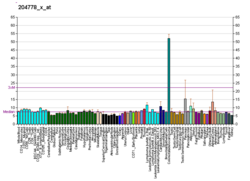Homeobox protein Hox-B8 is a protein that in humans is encoded by the HOXB8 gene.[5][6][7]
Function
This gene is a member of the Antp homeobox family and encodes a nuclear protein with a homeobox DNA-binding domain. It is included in a cluster of Homeobox B genes located on chromosome 17. The encoded protein functions as a sequence-specific transcription factor that is involved in development. Increased expression of this gene is associated with colorectal cancer. Mice that have had the murine ortholog (see Homology (biology) § Orthology) of this gene knocked out exhibit an excessive pathologic grooming behavior. This behavior is similar to the hair-pulling behavior of humans suffering from trichotillomania (TTM).[7]
Transplantation of normal (wild-type) bone marrow into a Hoxb8 mutant mouse results in a reduction of compulsive grooming.[8]
See also
References
- ^ a b c GRCh38: Ensembl release 89: ENSG00000120068 – Ensembl, May 2017
- ^ a b c GRCm38: Ensembl release 89: ENSMUSG00000056648 – Ensembl, May 2017
- ^ "Human PubMed Reference:". National Center for Biotechnology Information, U.S. National Library of Medicine.
- ^ "Mouse PubMed Reference:". National Center for Biotechnology Information, U.S. National Library of Medicine.
- ^ McAlpine PJ, Shows TB (Jul 1990). "Nomenclature for human homeobox genes". Genomics. 7 (3): 460. doi:10.1016/0888-7543(90)90186-X. PMID 1973146.
- ^ Scott MP (Nov 1992). "Vertebrate homeobox gene nomenclature". Cell. 71 (4): 551–3. doi:10.1016/0092-8674(92)90588-4. PMID 1358459. S2CID 13370372.
- ^ a b "Entrez Gene: HOXB8 homeobox B8".
- ^ Chen SK, Tvrdik P, Peden E, Cho S, Wu S, Spangrude G, Capecchi MR (May 2010). "Hematopoietic origin of pathological grooming in Hoxb8 mutant mice". Cell. 141 (5): 775–85. doi:10.1016/j.cell.2010.03.055. PMC 2894573. PMID 20510925.
Further reading
- Peverali FA, D'Esposito M, Acampora D, Bunone G, Negri M, Faiella A, Stornaiuolo A, Pannese M, Migliaccio E, Simeone A (Oct 1990). "Expression of HOX homeogenes in human neuroblastoma cell culture lines". Differentiation; Research in Biological Diversity. 45 (1): 61–9. doi:10.1111/j.1432-0436.1990.tb00458.x. PMID 1981366.
- Giampaolo A, Acampora D, Zappavigna V, Pannese M, D'Esposito M, Carè A, Faiella A, Stornaiuolo A, Russo G, Simeone A (Jun 1989). "Differential expression of human HOX-2 genes along the anterior-posterior axis in embryonic central nervous system". Differentiation; Research in Biological Diversity. 40 (3): 191–7. doi:10.1111/j.1432-0436.1989.tb00598.x. PMID 2570724.
- Acampora D, D'Esposito M, Faiella A, Pannese M, Migliaccio E, Morelli F, Stornaiuolo A, Nigro V, Simeone A, Boncinelli E (Dec 1989). "The human HOX gene family". Nucleic Acids Research. 17 (24): 10385–402. doi:10.1093/nar/17.24.10385. PMC 335308. PMID 2574852.
- Boncinelli E, Acampora D, Pannese M, D'Esposito M, Somma R, Gaudino G, Stornaiuolo A, Cafiero M, Faiella A, Simeone A (1990). "Organization of human class I homeobox genes". Genome. 31 (2): 745–56. doi:10.1139/g89-133. PMID 2576652.
- Apiou F, Flagiello D, Cillo C, Malfoy B, Poupon MF, Dutrillaux B (1996). "Fine mapping of human HOX gene clusters". Cytogenetics and Cell Genetics. 73 (1–2): 114–5. doi:10.1159/000134320. PMID 8646877.
- Vider BZ, Zimber A, Hirsch D, Estlein D, Chastre E, Prevot S, Gespach C, Yaniv A, Gazit A (Mar 1997). "Human colorectal carcinogenesis is associated with deregulation of homeobox gene expression". Biochemical and Biophysical Research Communications. 232 (3): 742–8. doi:10.1006/bbrc.1997.6364. PMID 9126347.
- Dias Neto E, Correa RG, Verjovski-Almeida S, Briones MR, Nagai MA, da Silva W, Zago MA, Bordin S, Costa FF, Goldman GH, Carvalho AF, Matsukuma A, Baia GS, Simpson DH, Brunstein A, de Oliveira PS, Bucher P, Jongeneel CV, O'Hare MJ, Soares F, Brentani RR, Reis LF, de Souza SJ, Simpson AJ (Mar 2000). "Shotgun sequencing of the human transcriptome with ORF expressed sequence tags". Proceedings of the National Academy of Sciences of the United States of America. 97 (7): 3491–6. Bibcode:2000PNAS...97.3491D. doi:10.1073/pnas.97.7.3491. PMC 16267. PMID 10737800.
- Fujino T, Yamazaki Y, Largaespada DA, Jenkins NA, Copeland NG, Hirokawa K, Nakamura T (Jul 2001). "Inhibition of myeloid differentiation by Hoxa9, Hoxb8, and Meis homeobox genes". Experimental Hematology. 29 (7): 856–63. doi:10.1016/S0301-472X(01)00655-5. PMID 11438208.
- Knoepfler PS, Sykes DB, Pasillas M, Kamps MP (Sep 2001). "HoxB8 requires its Pbx-interaction motif to block differentiation of primary myeloid progenitors and of most cell line models of myeloid differentiation". Oncogene. 20 (39): 5440–8. doi:10.1038/sj.onc.1204710. PMID 11571641.
- Greer JM, Capecchi MR (Jan 2002). "Hoxb8 is required for normal grooming behavior in mice". Neuron. 33 (1): 23–34. doi:10.1016/S0896-6273(01)00564-5. PMID 11779477. S2CID 18832852.
- Kosaki K, Kosaki R, Suzuki T, Yoshihashi H, Takahashi T, Sasaki K, Tomita M, McGinnis W, Matsuo N (Feb 2002). "Complete mutation analysis panel of the 39 human HOX genes". Teratology. 65 (2): 50–62. doi:10.1002/tera.10009. PMID 11857506.
External links
- HOXB8+protein,+human at the U.S. National Library of Medicine Medical Subject Headings (MeSH)
This article incorporates text from the United States National Library of Medicine, which is in the public domain.














